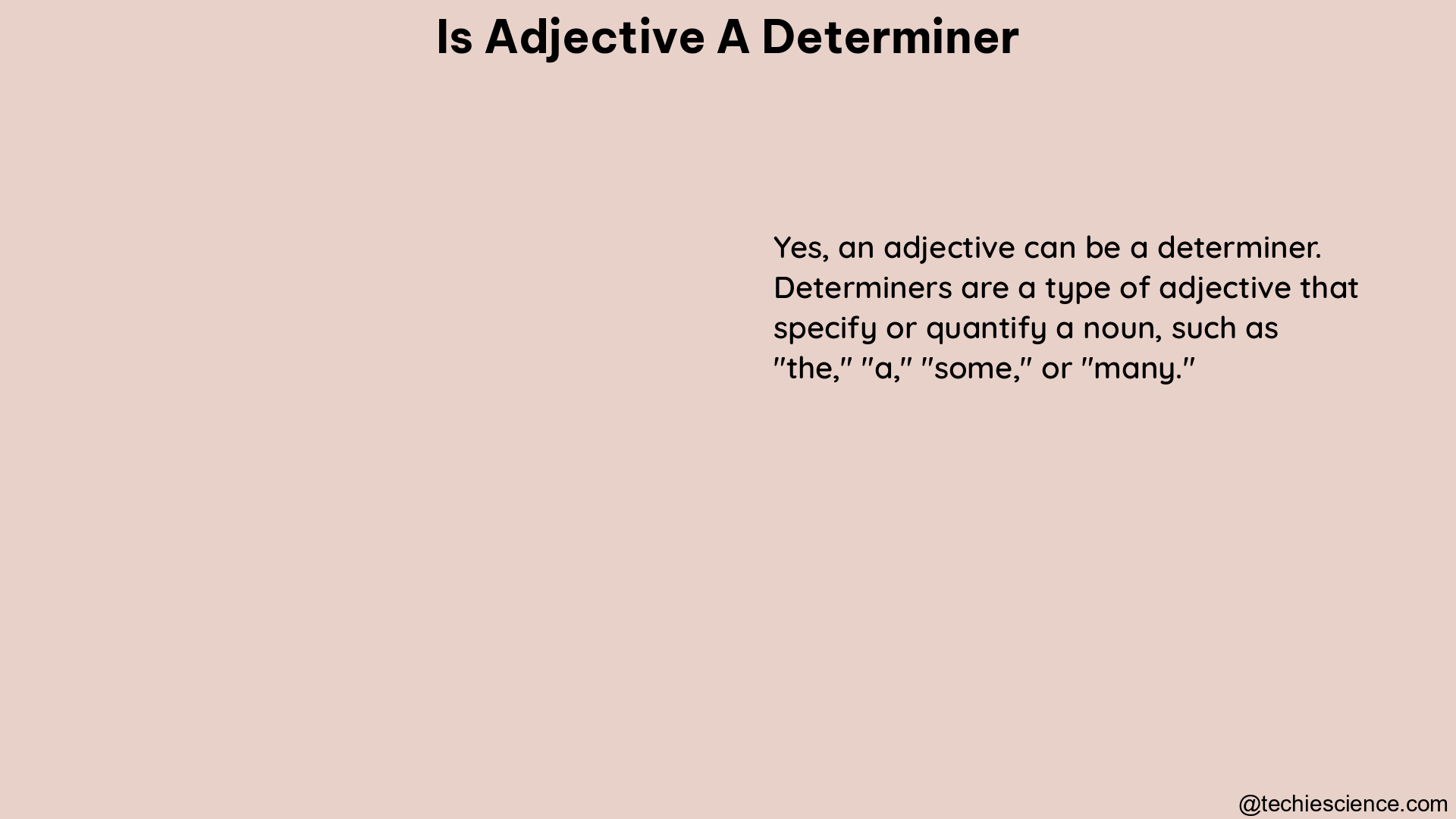The relationship between adjectives and determiners is a complex topic in English grammar, and it has been the subject of much debate among linguists and grammarians. While both adjectives and determiners modify nouns, they serve distinct functions and have unique grammatical properties. This comprehensive guide will delve into the nuances of this distinction, providing a detailed exploration of the definitions, key differences, and examples of adjectives and determiners.
Definition and Function
Adjectives
Adjectives are words that modify nouns and pronouns by describing a particular quality or characteristic of the word they are modifying. They can be classified as either gradable or non-gradable. Gradable adjectives, such as “hot” or “big,” can be compared using comparative and superlative forms (e.g., “hotter,” “biggest”). Non-gradable adjectives, on the other hand, cannot be compared and are used to describe absolute or inherent qualities, such as “dead” or “unique.”
Determiners
Determiners are words that introduce a noun phrase and specify something about the number, definiteness, or ownership of the noun. They are also referred to as “limiting adjectives” because they limit or specify the noun they modify. Determiners can be further classified into various subcategories, including possessive determiners (e.g., “my,” “her”), demonstrative determiners (e.g., “this,” “that”), and quantifying determiners (e.g., “many,” “few”).
Key Differences

-
Modification: Adjectives describe a quality of the noun, while determiners specify or determine which noun is being referred to.
-
Comparative Forms: Adjectives can have comparative forms (e.g., “hot” → “hotter”), but determiners do not.
-
Removal: Adjectives can often be removed from a sentence without affecting its grammatical correctness, whereas determiners are usually obligatory and cannot be removed without altering the sentence’s meaning.
-
Reference: Determiners often refer back to something previously mentioned (like a pronoun), whereas adjectives do not have an antecedent.
-
Subject Complements: Adjectives can be used as subject complements, but determiners cannot.
Examples and Classification
Possessive Determiners
Possessive determiners, such as “my” and “her,” specify the ownership or possession of the noun they modify.
Example:
– “My car is parked outside.”
– “Her book is on the table.”
Demonstrative Determiners
Demonstrative determiners, such as “this” and “that,” specify which one or ones out of a group of nouns are being referred to.
Example:
– “This apple is ripe.”
– “That house is painted blue.”
Quantifying Determiners
Quantifying determiners, such as “many” and “few,” specify the quantity or amount of the noun they modify.
Example:
– “Many people attended the concert.”
– “Few students passed the exam.”
Conclusion
In summary, while both adjectives and determiners modify nouns, they serve distinct functions and have unique grammatical properties. Adjectives describe the qualities of nouns, whereas determiners specify or determine the noun being referred to. The classification of determiners as a separate part of speech is supported by their distinct characteristics, which differentiate them from adjectives.
References
- https://english.stackexchange.com/questions/166474/is-a-determiner-considered-an-adjective-or-a-separate-part
- https://opentextbooks.library.arizona.edu/languageawareness/chapter/adjectives-determiners/
- https://www.reddit.com/r/grammar/comments/116gkvm/can_a_determiner_be_an_adjective/
- https://www.grammarly.com/blog/determiners/
- https://www.grammar-monster.com/lessons/difference_between_adjectives_and_determiners.htm
Hi… I am Sowndharya Jagadeeswaran, a university rank holder in M.A. English Literature. I have also done my master’s in Business Administration. Inquisitive as I am, my interest in action-oriented research helped me publish research papers in reputed journals. Now, as a career, I am an instructor where I teach young and adorable students the intricate technicalities of Public Speaking and Creative Writing. I also enjoy writing articles on topics I specialize and research in.
You can connect with me through LinkedIn.-